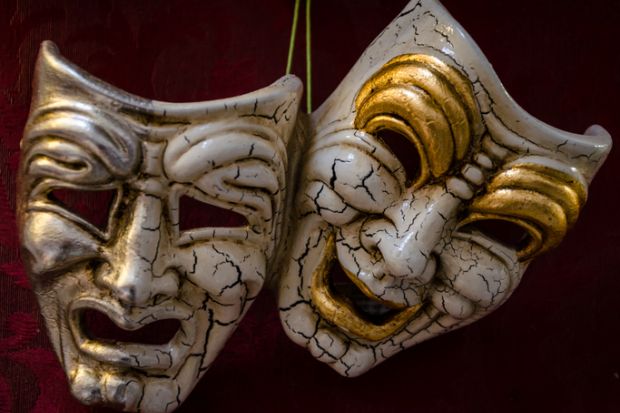A theatre scholar is launching a legal challenge to a London drama school’s decision to throw out claims that her PhD supervisor used “unique” ideas from her thesis without attribution.
Jo Ronan, a director and academic, is taking the Royal Central School of Speech and Drama, University of London to court after it rejected an allegation that one of her doctoral supervisors had appropriated concepts from her 2018 dissertation for a book on how theatre rehearsals can become more collaborative and less hierarchical.
Dr Ronan, who spent a decade developing her PhD while working as a lecturer at the University of the West of Scotland, said she was “shocked” when she heard last year that her theory of “dialectical collaborative theatre” was to feature heavily in an upcoming monograph by her supervisor.
She told Times Higher Education that she felt “totally dispossessed” by the alleged plagiarism.
Dr Ronan, who founded the performance group BloodWater Theatre in 2011 to experiment with her ideas of “non-hierarchical collaborative theatre”, said she was also “gobsmacked” by Central’s decision to dismiss her claim. An initial screening by external investigators appointed by the school found that there was “substance to the case”, she said.
Seeking a judicial review of Central’s decision, Dr Ronan is currently crowdfunding her legal costs, which could run to £60,000, and up to £120,000 if she loses, she estimates. She has raised more than £24,000 so far and says she needs to raise £30,000 to proceed to the next stage of her action.
“This is not about my ego or me being territorial about the research domain; and as I have left academia because of this, I am not doing this for career progression or status in this field,” said Dr Ronan, who did not want to name the supervisor in question.
Instead, she was “fighting so hard, not only for myself but for every researcher who is marginalised, at the mercy of those they are beholden to for their livelihood”. Dr Ronan added that the episode raised questions about power imbalances in PhD supervision and institutional accountability.
Dr Ronan’s supervisor is understood to deny any wrongdoing. In a statement, a Central spokeswoman said it took “allegations of misconduct extremely seriously and, where disputes may arise, treat[s] everyone involved with dignity and respect”.
“As soon as the allegation was made, we put in place robust procedures to investigate which followed UK Research Integrity Office guidelines through the process…to ensure a fair outcome as well as to protect the reputations both of those suspected of misconduct when the allegations are not confirmed, as well as those who make the allegations,” she said.
“The two-stage process for investigation was undertaken by panellists external to Central, appointed through a robust selection process which included taking external advice,” the spokeswoman said, explaining that the “findings of the independent review ultimately did not uphold the accusation of plagiarism”.
POSTSCRIPT:
Note: This article originally stated that plagiarism subject to legal action was alleged to have occurred in a book chapter. It has been corrected to state that plagiarism is alleged to have occurred in a book. It was also originally stated that the screening investigation was carried out by the UK Research Integrity Office. The article has been amended to reflect that it was conducted by external investigators appointed by the school in line with UKRIO guidance.
Register to continue
Why register?
- Registration is free and only takes a moment
- Once registered, you can read 3 articles a month
- Sign up for our newsletter
Subscribe
Or subscribe for unlimited access to:
- Unlimited access to news, views, insights & reviews
- Digital editions
- Digital access to THE’s university and college rankings analysis
Already registered or a current subscriber? Login








